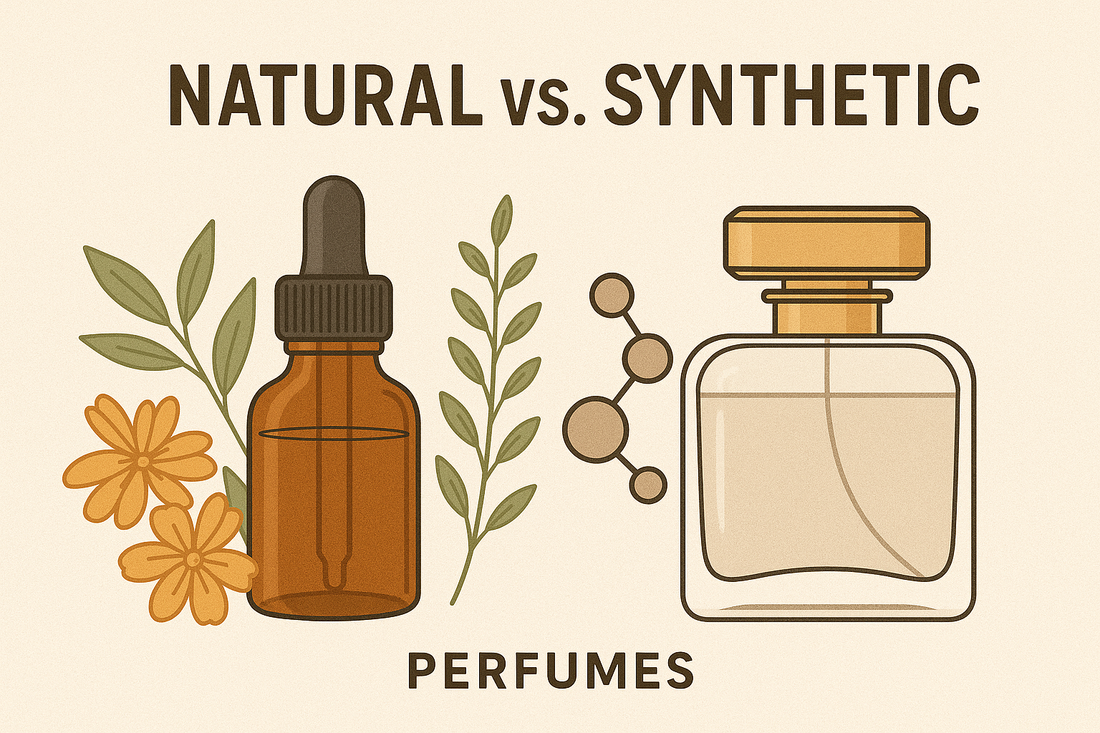
Natural vs Synthetic Perfumes: What’s the Difference?
Share
Perfume is more than just scent—it’s chemistry, memory, and identity. And when you look closely at what goes into a fragrance, the difference between natural and synthetic perfumes becomes clear—not just in how they smell, but in how they’re made, how they behave on the skin, and how they affect wellbeing.
Synthetic perfumes are built from man-made aroma chemicals. These are designed in labs to replicate natural scents or create entirely new ones. They’re often used because they’re cheap, long-lasting, and consistent. But many synthetic fragrance blends include phthalates—chemicals that help scents last longer but have been linked to hormone disruption and reproductive health effects (Duty et al., 2005; Swan, 2008). What’s more, the ingredients in commercial perfumes are rarely fully disclosed. The word “fragrance” on a label can legally mask hundreds of individual synthetic chemical substances.
Natural perfumes, on the other hand, are made from ingredients derived directly from plants: essential oils, absolutes, CO₂ extracts, and botanical waxes. These materials carry the complexity of the plant they come from—layers of volatile compounds that evolve as they unfold on your skin. They're not just pleasant to smell; they offer an experience that shifts with time, body heat, and movement.
One of the key benefits of natural perfumery is transparency. When you create your own perfume using pure botanical materials, you know exactly what’s in it. This is especially valuable for those with sensitivities or allergies, or for anyone who wants to avoid synthetic chemicals altogether.
There’s also a therapeutic dimension to natural perfumery. Certain essential oils have been shown to influence mood and wellbeing. Lavender and bergamot, for example, are used not only for their gentle floral notes, but also for their ability to help reduce stress and support emotional balance. When scent is made from whole plant extracts, you get more than a smell—you get the living energy of the plant itself.
At Zurma, we don’t currently make finished perfumes. We do provide the best natural ingredients—top notes like lime and neroli, heart notes like rose and geranium, base notes like vetiver and labdanum—so you can craft your own natural fragrance. Whether you’re blending for yourself or sharing your creations with others, natural perfumery is a way to reconnect with scent as an expression of self, place, and nature.
In order to make it easier to make your own natural perfumes we have made a range of Perfume Bases that are expertly blended with high-quality perfumer’s alcohol and a carefully measured amount of essential oils, absolutes, or CO₂ extracts. They’re designed to be a starting point for creating your own natural perfume—simply add additional essential oils to customise your scent. Ideal for both hobbyists and professionals, these bases make perfume blending easy, consistent, and beautifully fragrant.
It’s about slowing down. Exploring. Creating something bespoke, honest and beautiful. And knowing you smelling great hasn’t come at the cost of your health or the environment.
References
Duty, S. M., Ackerman, R. M., Calafat, A. M., & Hauser, R. (2005). Personal care product use predicts urinary concentrations of some phthalate monoesters. Environmental Health Perspectives, 113(11), 1530–1535. https://doi.org/10.1289/ehp.8083
Swan, S. H. (2008). Environmental phthalate exposure in relation to reproductive outcomes and other health endpoints in humans. Environmental Research, 108(2), 177–184. https://doi.org/10.1016/j.envres.2008.08.007
